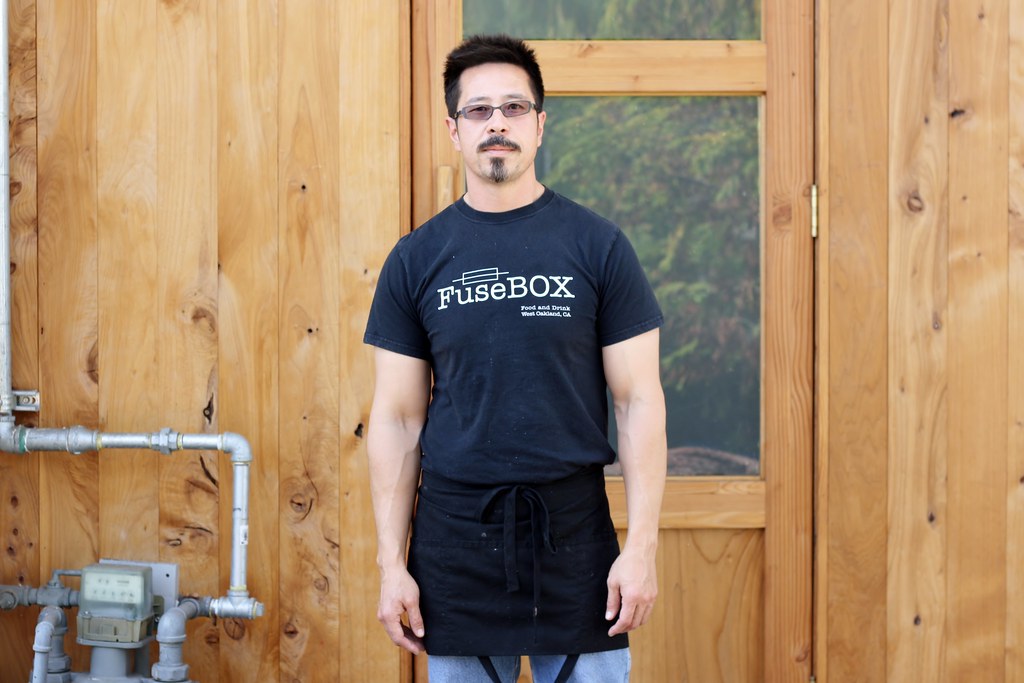
Chef Sunhui
Chang, the founder of FuseBOX in West Oakland
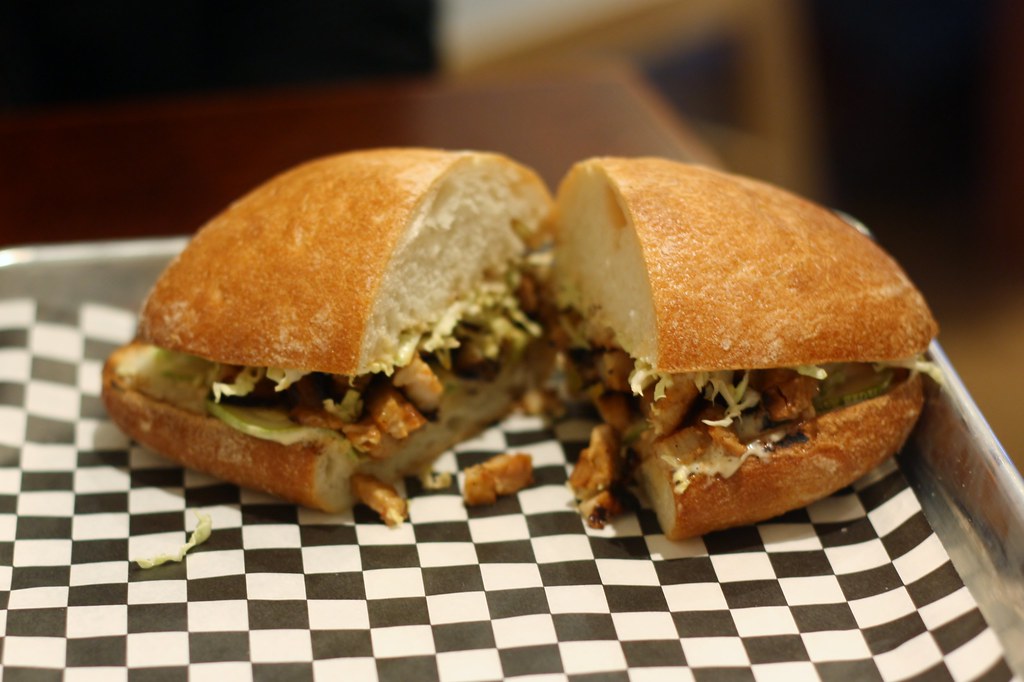
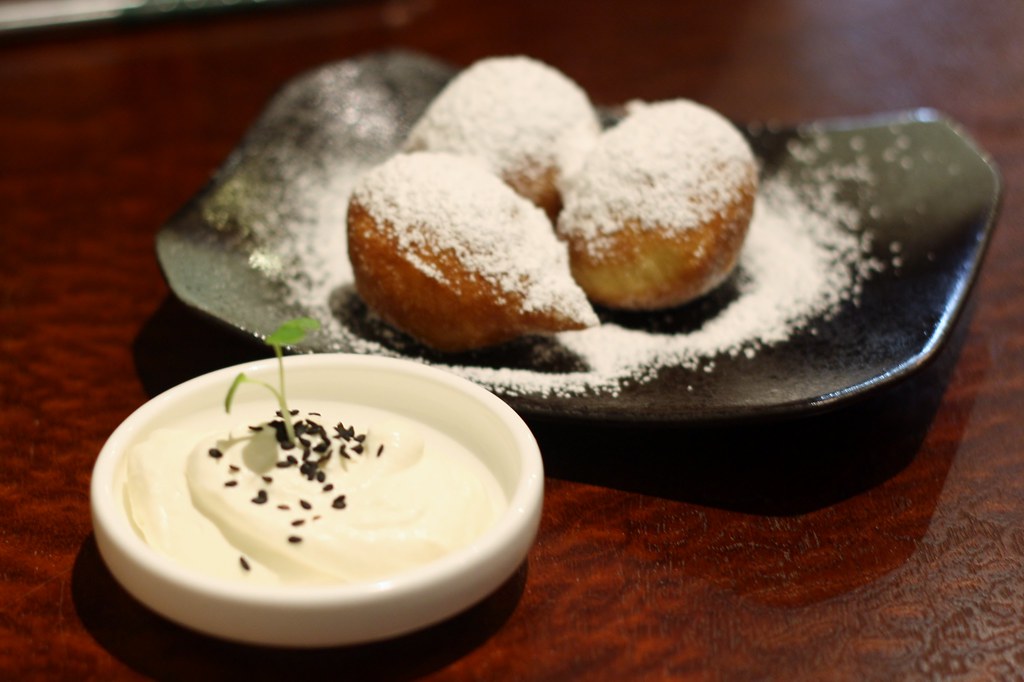
Korean Beignets
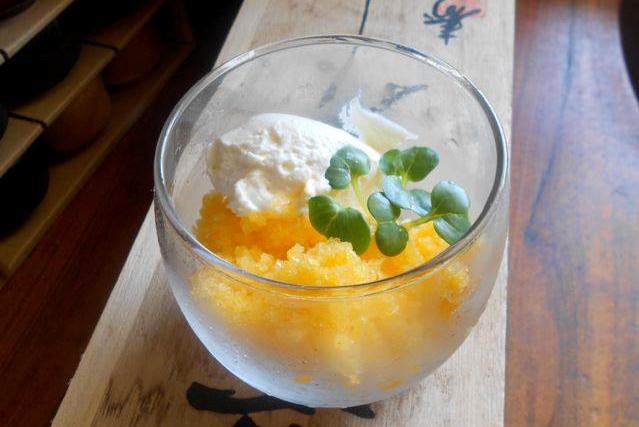
I'd like to introduce you to Chef Sunhui Chang, the founder and brains behind FuseBOX. Located a little over a mile away from 19th St. BART in Oakland, near 24th and Adeline, you'll find Chef Chang's Korean restaurant. After passing through the gated entrance, you'll see a long table with two benches set up for shared al fresco dining, reminiscent of those in a grade school cafeteria, as well as a neat, modern interior for inside eating.
FuseBOX serves traditional Korean food, more conceptual dishes, and non-Korean food altogether. What every dish has in common, or at least the six that I tried, are great attention to flavor, texture, and detail. It's great if you're looking for a fun izakaya-style lunch during the week or Korean beignets with a cup of coffee on a Saturday morning. I had the absolute pleasure of not only trying Chef Chang's fantastic food, but also learning more about the man who, as his black tee aptly states on the back, "I Bleed Kimchi."
FuseBOX serves traditional Korean food, more conceptual dishes, and non-Korean food altogether. What every dish has in common, or at least the six that I tried, are great attention to flavor, texture, and detail. It's great if you're looking for a fun izakaya-style lunch during the week or Korean beignets with a cup of coffee on a Saturday morning. I had the absolute pleasure of not only trying Chef Chang's fantastic food, but also learning more about the man who, as his black tee aptly states on the back, "I Bleed Kimchi."
Brittany:
Can
you tell us a bit about yourself?
Sunhui:
I was born in Incheon, South Korea. I moved to Guam when I was seven. Then I moved to the Bay Area when I was 17. I went to Berkeley High, then Cal. I was always in the food industry. My mom opened her award-winning Korean restaurant when I
was 13 and I worked in that kitchen till I moved out here. But my passion for food and cooking started before that.
I grew up on PBS cooking shows, [like] Julia Childs and Great
Chefs, Great Cities. I started watching
those shows when I was 10 - 11 years old.
Brittany:
What
inspired you to start FuseBOX?
Sunhui:
When I moved out of Berkeley and moved to Emeryville about seven years ago, I roamed around West Oakland and fell in love with the
Wild Wild West nature of West Oakland. Then
I moved to West Oakland four years ago and was
offered a spot about two blocks away from the current FuseBOX location. That location didn't work out as the owner went bankrupt
and the building went into foreclosure. But
I was fortunate that the owner of the current FuseBOX space took interest in
what I wanted to do. The industrial and Wild
West atmosphere sparked a vision of a Korean soju bang, like the soju bangs that my dad and his friends and
business colleagues would go to in South Korea. I
wanted to do Korean food. I was a bit
concerned as when I had my catering company, nobody wanted Korean cuisine.
But with the new interest that was brewing about
Korean cuisine, I felt this was the perfect time and the perfect place and I love
Korean food.
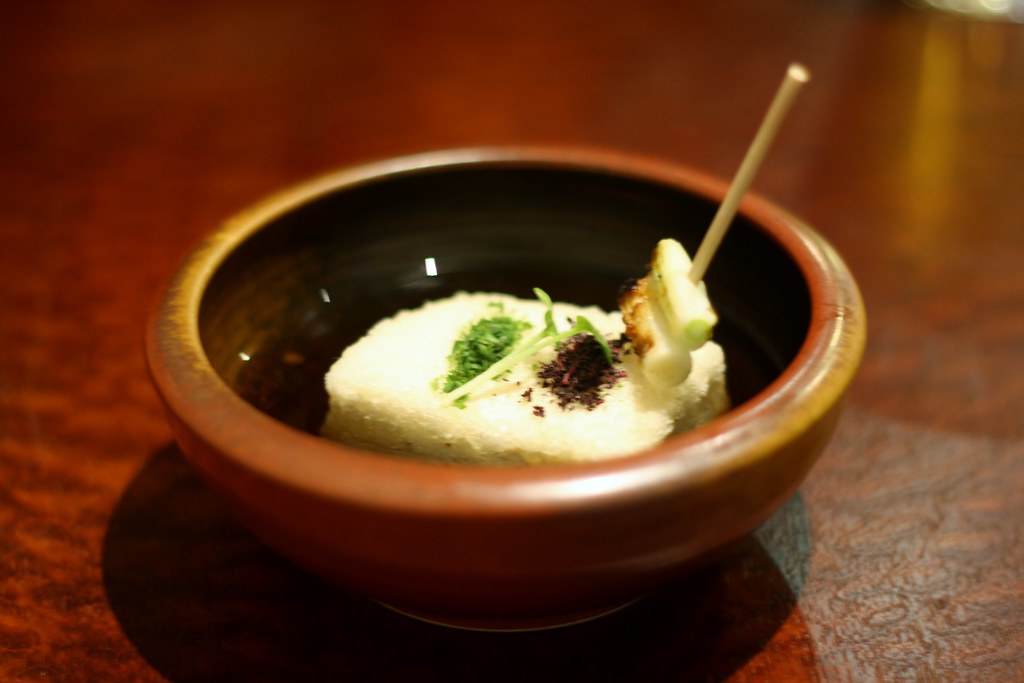
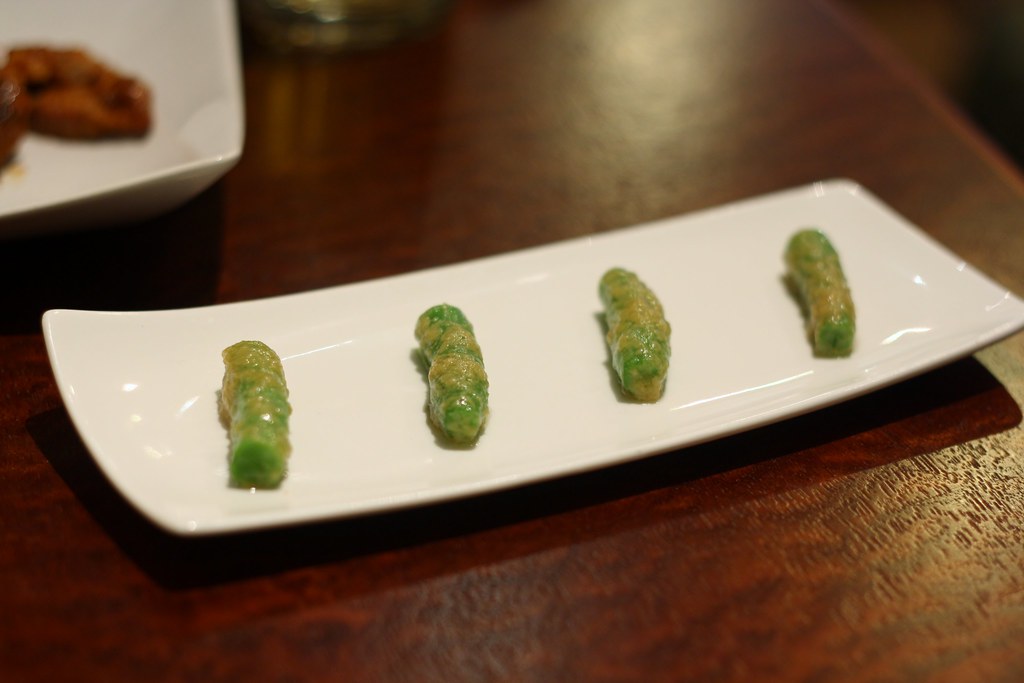
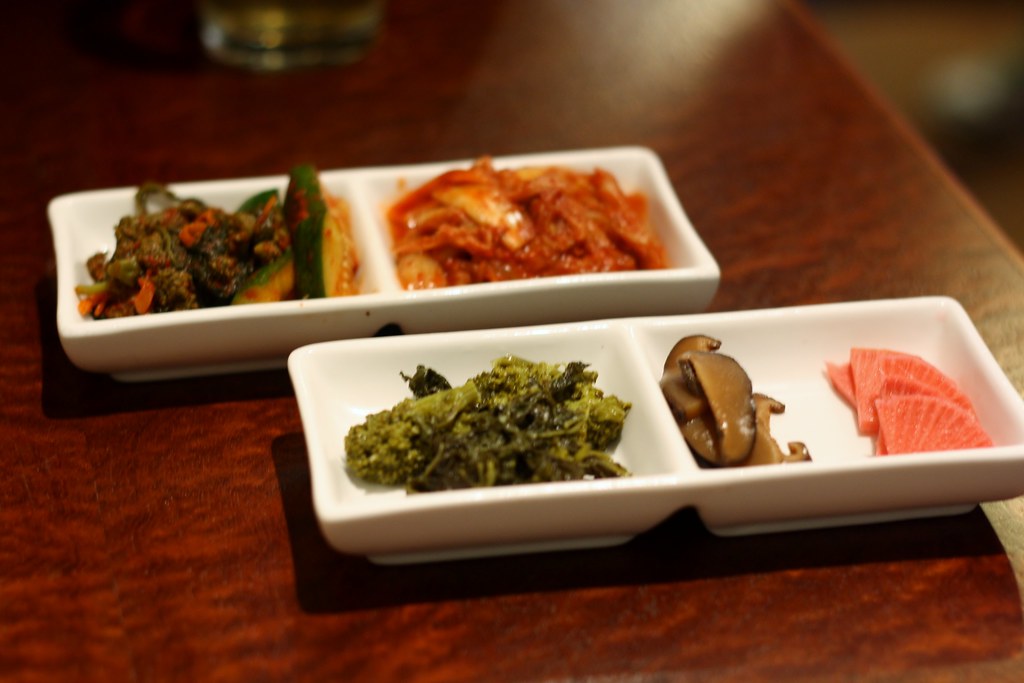
Banchan, featuring everything from kimchi vegetables to mushrooms and broccoli

In-House Tofu, deep-fried with tare no moto dashi

Buttered green beans

Banchan, featuring everything from kimchi vegetables to mushrooms and broccoli
Brittany:
How
did you come to the decision of serving Korean food in an izakaya format?
Sunhui:
I always found the izakaya format to be
fun for both diners and cooks. It gives diners playful decision-making and gives us cooks a creative platform. I also had a bunch of stuff that I love and wanted to
cook that was non-Korean. It really gives a
cook and a chef a lot of freedom.
Brittany:
Can
you describe the type of food a customer will encounter at FuseBOX?
Sunhui:
That's a tough one. Korean of course, but
mainly it’s food that I love to eat. Food
that is playful.
Brittany:
What
would you recommend for a first-time customer?
Sunhui:
Well, I would definitely suggest a bap
set which offers our banchans. Our bacon
mochi has been a hit. Our KFC is quite
popular. Our house-made tofu with tare no moto
dashi is one of my personal favorites. If
you want to be just down and dirty, our sandwiches are perfect for lunch.
And of course our skewers; you can get a veggie bap set and complement it with a
bunch of skewers. Get the sandwich with a
glass of Tang. For the last month, I’ve
added a Korean beignet, which is like a
donut mocha. I'm also proud of collaborating
with my Pastry Chef Adam Strahle on the Tang Granita Creamsicle. Can you tell that I love Tang? 

Busan (Pork Belly) Torta with savory cabbage and pickled
white zucchini
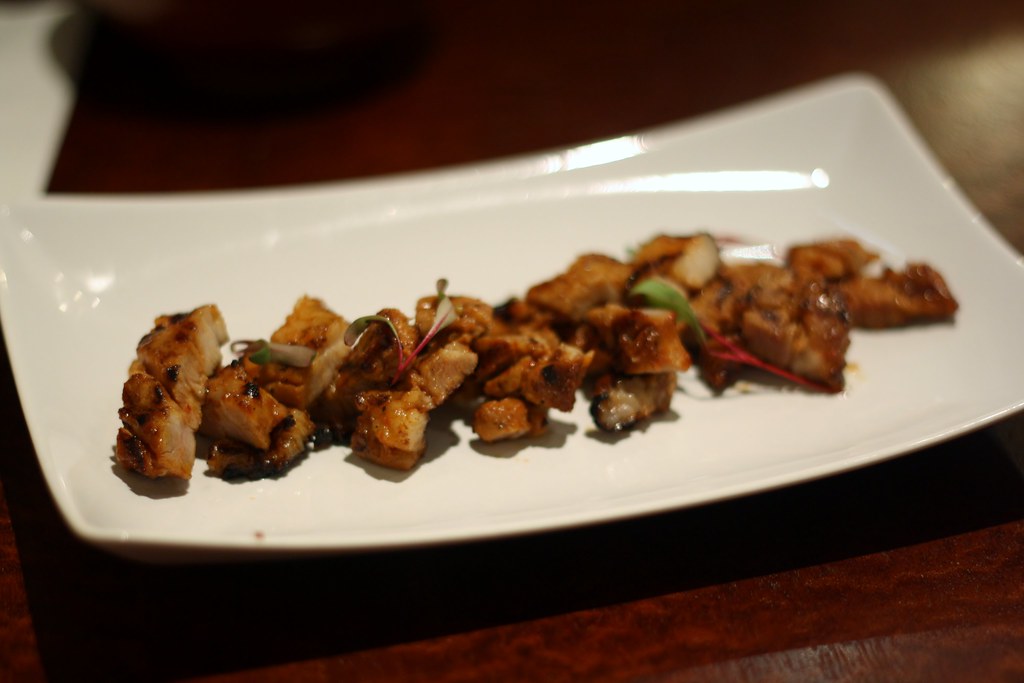
Grilled pork belly, which was served with rice (bap) and banchan

Grilled pork belly, which was served with rice (bap) and banchan
Brittany:
Sounds
like it! Can you describe the process of creating a new dish?
Sunhui:
Inspiration hits you in so many
different ways. Many times though, I always
go back to my childhood. I enjoy doing that
high-brow, low-brow thing, like with Tang
or creating miso pickled cream cheese, taking the lowly cream cheese and turning it into
something that is uniquely sophisticated. We
serve it with our house salad.
Brittany:
What
ingredients do you get most excited about?
Sunhui:
Good question. Ingredients that I feel are somewhat neglected such as "vegetable offal," parts of the vegetable that most people throw away.
I love breaking down a vegetable to its different
parts. For example, I have fallen in love
with yau choy. Yau choy can be broken down
to its leaves, its stems, its stalk, and its blossom, each with its own merits, its
own flavor, its own texture, which means I
can then use this one plant to give me several dishes. I'm an omnivore, but I love my vegetables.

Korean Beignets

Tang Granita Cremesicle, created by Chef Chang and Pastry
Chef Adam Strahle
Brittany:
What
types of dishes would you like to make but haven’t already?
Sunhui:
Well, I've left off the seafood items on
my lunch menu, so that I could offer it for dinner. I'm excited to hear what
people would think of the air-dried trout. It's
placed in a salt brine, then dried out in the night air. But before I dry it, I sprinkle it with aonori and lace it
with greens or kyen yip or shiso or basil. Also, a couple of tartars and when the weather starts getting cooler, the dakjjim.
Brittany:
How
has living in Oakland influenced your work?
Sunhui:
I can honestly say that FuseBOX would
not have been created if it wasn't for Oakland. FuseBOX
would not have taken place anywhere else except Oakland and West Oakland at that.
The
diversity set me free to explore cultures and flavors. I don't think I would have created some of my dishes if I
lived elsewhere. I love Oakland and the
people of Oakland. I also love all types of
cuisine. That's one of the reasons why I
love Oakland so much. It's that diversity
thing. I feel every culture has something I
love to eat.
Brittany:
What
can we expect to see from you in the future?
Sunhui:
Beside more service hours from FuseBOX,
such as dinner, I'm excited about opening
for coffee and Korean beignets in the weekend mornings. As for my culinary future, I'm constantly playing around
and evolving. I also love to collaborate. The cooks that I work with have a lot
to do with what direction I might go. I love
being inspired by others. My Pastry Chef
Adam Strahle and I have been having great brainstorms. He's also a great young cook. He's not just limited to
sweets. There's no precise direction that I
can say that I'm following except that whatever I do will be with a great deal
of passion. As for my professional career, I
always want to cook, but I do have a dream of opening a small boutique hotel.
FuseBOX
2311A
Magnolia St., Oakland, CA 94607
Open:
Wednesday - Saturday 11:30 - 2:30, Sunday mornings
(check
Facebook and Twitter for updates)
All of the photos were taken by myself, except the last
photo which is used with the permission of Chef Chang.